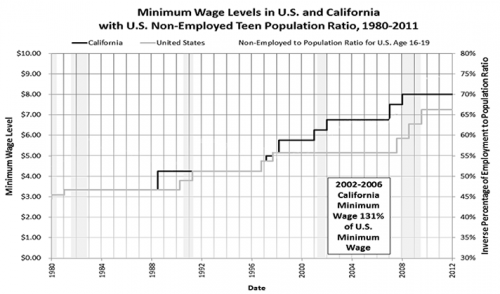State Approves Minimum Wage Increase
DIANA LI
News Editor
Out of all 50 states, California boasts one of the highest minimum wages at $8 per hour. However, due to recent legislation, it will soon grow even higher.
Governor Jerry Brown signed AB 10, a bill that will raise California’s minimum wage by 25 percent. By 2016, the minimum wage will rise from $8 per hour to $10. The raise will be gradual; the first phase increases the current wage to $9 by July 2014, and the second phase completes the raise.
Brown justified his decision to raise the state’s minimum wage, stating that it was his “moral responsibility” to keep Californian families thriving in the face of ever-rising costs of living. The raise will also aid in reducing the gap between the upper class and the working class.
“The minimum wage has not kept pace with rising costs [of living],” Brown said in a statement. “This legislation is overdue and will help families that are struggling in this harsh economy.”
According to the LA Times, 29-year-old Oscar Sanchez works at a South Los Angeles car wash, and is one of many workers who will benefit from the passage of AB 10. Sanchez earns around $500 a week which goes toward living expenses and other necessities. With impending wage increases, however, he will earn enough to send a portion of his income to his family in Guatemala.
“These people work [very] hard,” senior Stephanie Campos said. “Since [their] wages will be increased, [they] will have more money to spend, which leads to the economy being stimulated.”
Despite praise for AB 10, others argue that such a proposal will inevitably reduce jobs. Many small business owners oppose the bill, and a coalition of employers, including the California Restaurant Association and the California Chamber of Commerce, say that “the new law could backfire by forcing companies to raise prices, cut worker hours or even lay off some employees,” as stated in the LA Times.
A similar development was the “Fast Food Forward” campaign, which is funded by New York Communities for Change. On Aug. 29, fast-food chain employees spread out within 60 different American cities and protested at over 1,000 fast-food restaurants, calling for a raise in federal minimum wage from $7.25 to $15 an hour. However, fast food corporations argue that if more money goes toward employees’ wages, the prices of fast food will also rise, which is a burden that consumers will have to bear.
“I would feel cheated because it’s not my responsibility to pay for the workers. It’s the companies’ jobs to see that both their employees and consumers are happy with the situation,” junior Sara Hernandez said.
Despite the possibility of having to pay more expensive food, others support raising employees’ wages.
“[I’m] okay with the rise in cost due to the fact that many people working minimum wage jobs need money, and an extra dollar here and there goes a long way,” junior David Hernandez said.
Nonetheless, Obama has proposed to raise the federal minimum wage to at least $9 per hour. The Fair Minimum Wage Act of 2013, which was introduced in the House of Representatives and the Senate, could potentially raise the federal minimum wage to $10.10 per hour by 2015 if passed. Like California’s wage increase, the act would also raise the federal minimum wage in phases of varying spans of time.
Furthermore, the minimum wage would stay adjusted to the rising cost of living, which is called indexing. Currently, 10 states use indexing to prevent minimum wage workers from losing purchasing power.
